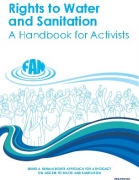Governance
Private water supply, sanitation and hydropower projects and reforms projects involving privatisation and commercialisation in India - Database by Manthan Adhyayan Kendra
Posted on 31 Jan, 2011 11:16 PMThe database has been developed as a part of Manthan Adhyayan Kendra's engagement in comprehensive monitoring, research and analysis of policies, programs and projects relating to privatisation/commercialisation of water sector.
Right to water and sanitation - A handbook for activists by Freshwater Action Network (FAN) Global
Posted on 31 Jan, 2011 10:11 PM With tihs, they can improve water and sanitation service regulation and provision at international, national and local levels. Directed primarily at community groups, human rights NGOs, rights-based development practitioners and aid workers, this handbook aims to strengthen human rights-based advocacy by providing innovative and practical suggestions that activists and organisations can use in their work. It also acts as a resource guide for finding further information.
With tihs, they can improve water and sanitation service regulation and provision at international, national and local levels. Directed primarily at community groups, human rights NGOs, rights-based development practitioners and aid workers, this handbook aims to strengthen human rights-based advocacy by providing innovative and practical suggestions that activists and organisations can use in their work. It also acts as a resource guide for finding further information.
Water and sanitation are essential for living a healthy life with dignity. However, around a billion people across the world lack access to a safe and sufficient water supply to cover their basic needs. Over 2.5 billion people lack access to adequate sanitation and nearly 1.2 billion face the indignity of open defecation every day.
The Millennium Development Goal (MDG) target to halve the proportion of people without sustainable access to safe drinking water and basic sanitation by 2015 is seriously off track, with sanitation severely lagging behind. For example, estimates suggest that at current rates of progress, sub-Saharan Africa will miss the MDG water target by about 25 years, while the sanitation target may not be reached until well into the 22nd century.
Urban water pricing: Setting the stage for reforms – A study by National Institute of Public Finance Policy
Posted on 31 Jan, 2011 08:22 PMIt underlines, in this regard, the importance of a responsible municipal fiscal and financial system, simplification of existing water pricing and tariff structures, and regulatory mechanisms which are able to balance the interests of the producers and consumers of urban services.
Revised composition of working group on rural domestic water and sanitation for the Twelfth Five-Year Plan (2012-2017)
Posted on 31 Jan, 2011 01:21 PMA copy of the revised composition order is enclosed.
Irrigation tanks and their traditional local management - A remarakable ancient history of India - Paper presented at the National Seminar on Water and Culture (2007)
Posted on 31 Jan, 2011 03:20 AMTanks are rainwater harvesting techniques which capture water during monsoons for later use. Mention of tanks in colonial texts is made and the authors infer from ancient texts like Tamil Purananuru on the importance of tanks and the locations for their construction, as well detailing their geographical spread.
Applicability of traditional wisdom in water management in Konkan region of Maharashtra - Paper presented at the National Seminar on Water and Culture (2007)
Posted on 31 Jan, 2011 02:51 AMThe state government's investments in supplying potable water under the Maharashtra Jeevan Pradhikaran (MJP) scheme which envisaged a no tanker supply' end to the scheme is critiqued. The authors note that the project mainly concentrated on asset creation, neglecting operation and maintenance resulting in limited improvement in villages, with respect to water supply.
Dying wisdom of medieval water management of Aurangabad city - Paper presented at the National Seminar on Water and Culture (2007)
Posted on 31 Jan, 2011 01:40 AMThe city of Aurangabad has benefited from the construction of aqueducts and canals by its earlier rulers. According to the authors between 1617 and 1803, a number of aqueducts and canals were constructed.
Summary report - Maharashtra government consultation on Ratnagiri and Sindhudurg districts - MoEF
Posted on 31 Jan, 2011 12:12 AMContent Courtesy: Ministry of Environment and Forests, Government of India
Author: Madhav Gadgil
In view of the environmental sensitivity and ecological significance of the Western Ghats region and the complex nature of its geography, as well as the possible impacts of climate change on this region, the Ministry of Environment & Forests, Government of India constituted a Western Ghats Ecology Expert Panel to assess the current status of ecology of the Western Ghats region. The panel aimed at identifying ecologically sensitive areas in the Western Ghat region and making recommendations for the conservation, protection and rejuvenation of the region. This report presents a brief summary of the key issues that were dwelt on to understand the situation of the Western ghats and the key findings of the evaluation.
Traditional water management practices and water sector reforms in South India - A comparative analysis of three systems and Participatory Irrigation Management policy - Paper presented at the National Seminar on Water and Culture (2007)
Posted on 30 Jan, 2011 06:13 PMThe authors study three tanks; one each in Karnataka, Andhra Pradesh and Kerala and find that almost all tanks in Southern India face similar problems that include farmers in command area being deprived of water, siltation, lack of proper maintenance of such structures, lack of political will to decentralise authority to tank institutions etc.
Traditional water management practices in coastal Karnataka - Paper presented at the National Seminar on Water and Culture (2007)
Posted on 30 Jan, 2011 04:10 PMTh paper begins with a brief history of the region of Southern Kanada, its geography and the religious practices of the region. Some of the key features of this region includes an abundance of rivers though they mostly are rain-fed.





